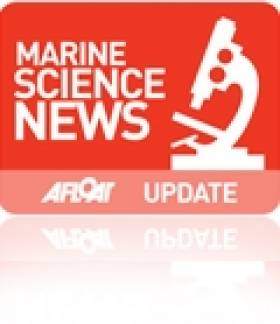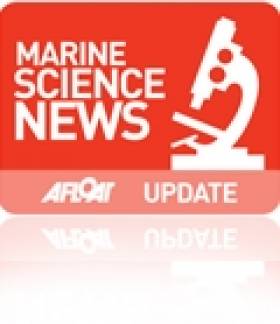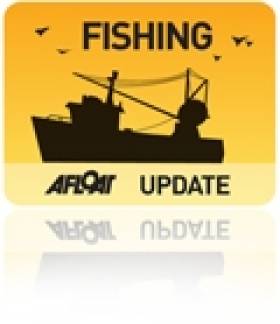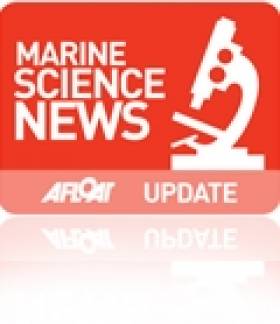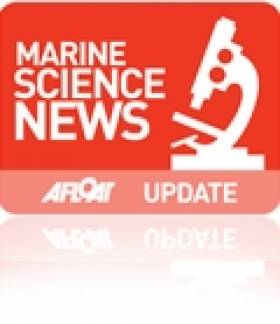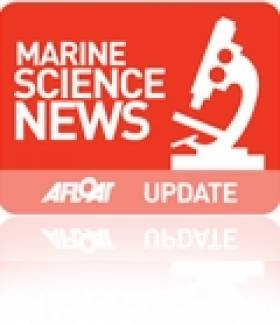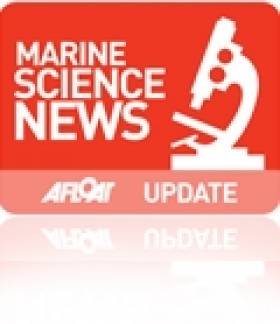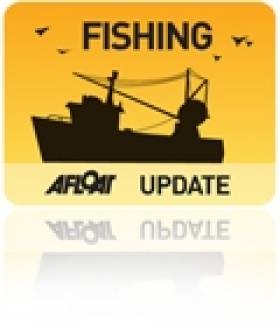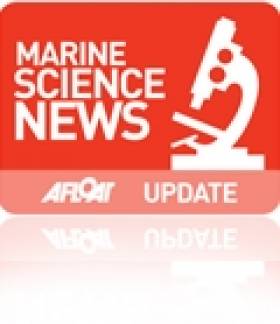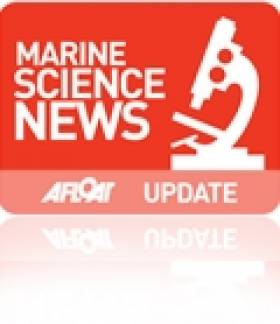Displaying items by tag: Marine Institute
Scientific Ship-Time Applications Now Open for 2014-2015
#ResearchShipTime – The Marine Institute are calling for applications for those wishing to accept ship-time on board the research vessels RV Celtic Explorer and RV Celtic Voyager in 2014 and 2015.
Applications for ship-time must be submitted using Research Vessel Operations' on-line 'Survey Planning System' (SPS) before 20th September 2013.
Applicants can get further information from the Apply for Ship-time pageApplications for ship-time must be submitted using Research Vessel Operations' on-line 'Survey Planning System' (SPS) before 20th September 2013.
Applicants can get further information from the Apply for Ship-time page on the Marine Institute website www.marine.ie and contact [email protected] to obtain login details to SPS.
Applicants should read The Vessel Charter Guidelines (.doc 256 KB) prior to submitting their application.
Applicants may seek grant-aid to cover all or part of the vessel charter costs.
For information on eligibility for grant-aid and additional application requirements please refer to the Grant-Aid Guidelines
Note: Applications for grant-aid will only be accepted for ship-time in 2014. Applications for grant-aid for ship-time in 2015 will be accepted in 2014.
Persons considering making an application for shiptime for training purposes are advised to consult with Strategic Marine Alliance for Research and Training (SMART) via [email protected].
This marine science partnership programme is designed to standardise and optimise ship based training for 3rd level students and provide nationally accredited ship based training activities.
The RV Celtic Explorer will once again be making transatlantic passages to complete a survey in Newfoundland waters in April 2014 (Westward) and May (Eastward) and a targeted call for applications to utilise these transects is being included in this year's call.
Applications are invited from researchers to utilise to utilise the vessel for up to a 14 day period on the western transect starting in mid-April 2014.
The initiative is planned to coincide with a planned charter survey in Newfoundland waters in April/May 2014 and is a precursor to future transatlantic co-operative research as outlined at the recent Atlantic Strategy meeting which included EU, US and Canadian Partners.
The PIP funding scheme will accept proposals for part funding of shiptime and full funding of associated research. For further information please go to their website: http://www.pip.ie/page/1
Marine Institute To Be Centre of Global Marine Research
#MarineScience - Galway Bay FM reports that the Marine Institute in Galway is to become one of the world's leading marine research centres.
The news comes in the wake of a groundbreaking deal signed in Galway on Friday afternoon (24 May) between the EU, the US and Canada to join forces on Atlantic Ocean research, as previously reported on Afloat.ie.
All partners have agreed to commit to funding to study the interplay of the Atlantic with the Arctic Ocean, and discover ways that research on the oceans and marine wildlife can contribute to scientific advances in other areas.
Meanwhile, a monitoring system for waste waters is among the projects that will benefit from a near €1 million in funding from the Science Foundation.
Research Minister Seán Sherlock announced the funding for projects at NUI Galway that is hoped to deliver "commercialisation of research in a range of areas".
Connemara Oyster Grounds To Lose Disease-Free Status
#Fishing - The Marine Institute is encouraging the agreement of a new code of practice for oyster fishing at Ballinakill Bay in Co Galway, which is set to lose its disease-free status.
Galway Bay FM reports that a single oyster out of 900 tested at the bay, near Letterfrack on the north-west coast of Connemara, tested positive for the Ostreid herpes virus two years ago as part of an EU-supported programme.
Though accounting for just 0.11% of the entire sample, the positive test is enough to strip the area of its clean status.
Senator Trevor O'Clochartaigh raised the issue in the Seanad last week, which prompted the Department of the Marine to confirm that the Marine Institute recommends a code of practice that would see the area's status eventually reinstated.
INFOMAR Maps Out Proposed Operations for 2013
#INFOMAR – The Integrated Mapping for the Sustainable Development of Ireland's Marine Resource, in short (INFOMAR) have outlined their proposed mapping operations for 2013.
INFOMAR (covering 125,000 sq kms) is a joint venture between the Geological Survey of Ireland (GSI) and the Marine Institute.
During the current year of INFOMAR Phase 1 (2006-2016), operations are provisionally planned to take place within tabulated bays subject to approval from other agencies.
To see a map of proposed working area and more, Inshore Ireland (February / March) issue has a report.
As previously reported on Afloat.ie, the GSI's survey vessel RV Keary last month returned to service, having completed modifications carried out at Arklow Marine Services. The 15m aluminium catamaran research vessel was built in South Africa and is equipped with a full geographical suite.
Galway Hosts Shellfish Safety Science Workshop
#MarineScience - The 10th Shellfish Safety Science workshop will take place at the Marine Institute in Galway on Thursday 18 April 2013.
This one-day event is an opportunity for anyone working in the area of shellfish safety, including regulators, scientists as well as industry, to meet and exchange information on the latest advances in the field.
Irish regulatory agencies will provide updates on recent shellfish biotoxin, toxin-producing algae, harmful algal blooms and shellfish microbiology.
There will be presentations from research projects that are nearing completion on the toxicology and causative organism responsible for Azaspiracid shellfish poisoning which caused extensive economic hardship in 2012 and 2013.
A new EU project using advanced satellite imagery, mathematical modelling and real-time monitoring to provide short-term predictions will be demonstrated, showing how this multidisciplinary approach may provide useful information on biotoxin outbreaks for shellfish producers.
On the microbiological side, presentations on shellfish contamination from Norovirus and how the Shellfish Waters Directive aims to monitor and improve environmental conditions for shellfish cultivation will be given.
Further information on these and other aspects of the workshop are available on the Marine Institute website at www.marine.ie. Attendance is free but registration is required by emailing [email protected].
Scientific ‘Explorer’ Makes a Fleeting Call to Dublin Port
#IrishSeaSurvey – The Marine Institute's Galway based RV Celtic Explorer made a brief call yesterday to Dublin Port, while in between carrying out separate scientific surveys, writes Jehan Ashmore.
The 65m vessel, which is not a regular visitor to the port, had berthed at Ocean Pier. According to the Marine Institute's vessel survey schedule, she was conducting a Methane-derived Authigenic Carbonate (MDAC) survey headed by chief scientist Dr. Yvonne Leahy of the institute.
The survey was to complete a drop camera survey of a MDAC site in the Irish Sea, some 25 nautical miles offshore of Dublin Bay.
Celtic Explorer which is 2,425 tonnes and has a total of 35 personnel, and equally the same number of days in endurance range. Accommodation is for 22-30 scientists, 13-15 crew (dependent to operational requirements). Scientific quarters are for 4 single cabins and 9 double en-suite cabins.
Her inshore fleetmate, the 31m RV Celtic Voyager of 340 tonnes has an endurance capability of 14 days. A total of 15 personel made up of 8 scientists and 7 crew are accommodated in 4-berth quarters.
Live Online Updates From Irish Weather Buoy Network
#MarineInstitute - Keep track on the status of Ireland's coastal waters thanks to the Marine Institute's website, which features live updates from the Irish Marine Weather Buoy Network.
The network is a joint project designed to improve weather forecasts and safety at sea around Ireland. The buoy network provides vital data for weather forecasts, shipping bulletins, gale and swell warnings as well as data for general public information and research.
Data recorded by the six buoys dotted around Ireland's coastal waters, both offshore and far offshore, includes stats on atmospheric pressure, wind speed and direction, wave height and even salinity levels.
The project is the result of successful collaboration between the Marine Institute, the Department of Transport, Met Éireann and the UK Met Office.
IFI Welcomes New Research On Sea Lice and Wild Salmon
#FishFarm - Inland Fisheries Ireland has welcomed "a clear acceptance of the impact of sea lice on juvenile salmon" following a recent Marine Institute publication that identifies the effect of sea lice emanating from aquaculture facilities on wild Atlantic salmon mortality.
According to IFI, the paper published in the Journal of Fish Diseases "concurs with previously published international research" that it says establishes an incontrovertible link between fish farm developments and negative effects on local wild salmon numbers, as previously reported on Afloat.ie.
It adds that "the debate can now progress to identify the best methodologies to reduce or eliminate this impact" as well as moves on "the issue of escaped farmed salmon".
In a statement on the new paper, IFI says the research "identified that just under 40% of released juvenile salmon showed a significant difference in return rate between sea lice ‘treated’ and ‘non-treated’ groups, indicating that mortality from sea lice is significant in 40% of the releases in the study. Unfortunately, there was a significant effect from sea lice in six different bays along the west coast over the study period.
"This recent study provides further evidence that salmon will be impacted by sea lice. The location of salmon farms in relation to salmon rivers and the control of sea lice prior to and during juveniles salmon migration to their high seas feeding ground is critical if wild salmon stocks are not to be impacted.
"The development of resistance to chemical treatment of sea lice and other fish husbandry problems, such as pancreas disease and amoebic gill disease, are likely to make effective sea lice control even more difficult in future years."
IFI also highlights the Norwegian government's concerns about the impact of sea lice and escaped farm salmon on wild salmon stocks.
The statutory body for the protection and conservation for Ireland's inland fisheries reiterated its support for "the development of a sustainable aquaculture industry" to "safeguard wild salmon and sea trout stocks into the future".
It adds that recommendations on the above issues have been made in its submission to the Department of the Marine on the Environmental Impact Statement regarding the proposed deep-sea organic salmon farm in Galway Bay, a scheme that has been the subject of controversy over recent months.
Irish Marine Science Research Boosted By Two Major Funding Awards
#marinescience – The Minister for Jobs, Enterprise and Innovation, Richard Bruton TD and the Minister for Research and Innovation, Sean Sherlock TD, today (Friday 25th January 2013) announced funding totalling €60 million dedicated to 85 pioneering research initiatives. These awards administered via Science Foundation Ireland's (SFI) Investigator Programme included two major awards supporting Irish marine science research.
Speaking of the announcement of the SFI Investigator Awards, Minister for Research and Innovation Sean Sherlock said, "over the past decade, Ireland has invested heavily in R&D and the rewards are clearly visible. What is particularly heartening about today's announcement is that much of this excellent research, which was selected competitively following international peer review is being done in collaboration with companies who are seeking to find new products and services, including IBM Ireland, Intel Ireland, HP, EMC and Bord Gáis."
On behalf of the Marine Institute, Dr Heffernan, CEO of the Marine Institute congratulated Dr Dagmar Stengel of the National University of Ireland, Galway and Dr Jens Carlsson of University College, Cork for their excellent performance in securing research funds from this highly competitive SFI scheme.
"The two marine based projects listed in the SFI Investigator awards are a recognition of the internationally ranked quality of these Irish marine research scientists and the relevance of their work to Irish industry. These projects are particularly relevant to those firms which seek to develop value-added products based on marine biological resources and are a boost for Ireland's marine research community," said Dr Heffernan.
Dr Heffernan also highlighted the significance of what these awards mean to Ireland's Integrated Marine Plan, Harnessing Our Ocean Wealth stating "each project will deliver new knowledge that supports the plan's goals for a thriving maritime economy and healthy ecosystems."
Both researchers had previously been funded by the Marine Institute. Dr Jens Carlsson worked within the Fish Population Genetics project supported by the Beaufort Marine Science Awards. A project led by Dr Stengel, Phlorotannins in Irish Brown Seaweed - Investigations of their UV protective - Effects and Potential as Natural Sunscreens was funded under the NDP awards 2000-2006. Dr Stengel is currently a Principal Investigator on the MI/DAFM co-funded NutraMara marine functional foods project.
The SFI award to Dr Carlsson of €194,498 will support the project, Taxonomy and connectivity of animal species at the Moytirra hydrothermal vent field: developing methods for assessing ecological impacts of mineral extraction in the deep-sea. This award builds on the expedition held on the RV Celtic Explorer, which was funded by the Marine Institute and lead by University College, Cork that discovered the Moytirra hydrothermal vent field in July 2011.
Dr Stengel received an award of €244,782 to support her project, Iodine in commercially valuable Irish seaweeds: variability, pathways, and implications for industrial applications.
Marine Institute Invites Applications for Summer Work Placements
#MarineScience - The Marine Institute is inviting students to apply for a number of work experience placements in many exciting areas for this summer 2013.
The list and short description of the positions (available in a Word doc HERE) include 26 placements for 15 work titles.
The bursaries are worth €2,200 each for an eight-week placement based in various locations including the Marine Institute in Oranmore, Co Galway; Newport, Co Mayo; Harcourt Street in Dublin; and ports around the country.
The Marine Institute’s Bursary Programme provides valuable practical experience for budding marine scientists in areas of research such as marine fisheries, salmon management, aquaculture, environment, communications and the library.
The Bursary Programme is aimed at undergraduates of universities, institutes of technology and national institutes for higher education. The scheme is strictly limited to undergraduates who have completed two years' study in a relevant discipline.
Previous bursars have gone on to work in the Marine Institute (including two directors of the institute), Bord Iascaigh Mhara (BIM), regional fisheries boards, county councils, pharmaceutical companies and State laboratories, with some going as far afield as the EPA in Sydney, Australia and some now running their own companies.
To apply for the Summer Bursary Programme:
- Please check out the 15 bursary titles on offer (via the link above)
- Select the two bursaries that interest you most and in order of preference
- Complete the Marine Institute Bursary Application Form 2013 and return it FAO Annette Jordan, Marine Institute, Furnace, Newport, Co Mayo
The deadline for receipt of applications is 8 February 2013.



























